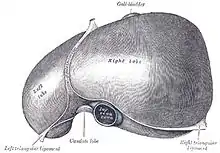כבד
Aramaic
Hebrew

כבד
Etymology 1
| Root |
|---|
| כ־ב־ד |
Noun
כָּבֵד • (kavéd) m
- liver (organ of the body)
- Leviticus 3:15, with translation of the Jewish Publication Society:
- וְאֵת שְׁתֵּי הַכְּלָיֹת וְאֶת־הַחֵלֶב אֲשֶׁר עֲלֵהֶן אֲשֶׁר עַל־הַכְּסָלִים וְאֶת־הַיֹּתֶרֶת עַל־הַכָּבֵד עַל־הַכְּלָיֹת יְסִירֶנָּה׃
- ve-et shtei ha-klayót ve-et ha-ḥélev ashér 'aleihén ashér 'al ha-ksalím ve-et ha-yotéret 'al ha-kavéd 'al ha-klayót y'sirénnah.
- and the two kidneys, and the fat that is upon them, which is by the loins, and the lobe above the liver, which he shall take away by the kidneys.
- Ezekiel 21:26, with translation of the Jewish Publication Society:
- כִּי־עָמַד מֶלֶךְ־בָּבֶל אֶל־אֵם הַדֶּרֶךְ בְּרֹאשׁ שְׁנֵי הַדְּרָכִים לִקְסָם־קָסֶם קִלְקַל בַּחִצִּים שָׁאַל בַּתְּרָפִים רָאָה בַּכָּבֵד׃
- Ki 'amad melekh Bavel el em ha-derekh, b-rosh shnei ha-drakhim, liq'sam qasem: qilqal ba-ḥitzim, sha'al ba-trafim. ra'ah ba-kaved.
- For the king of Babylon standeth at the parting of the way, at the head of the two ways, to use divination; he shaketh the arrows to and fro, he inquireth of the teraphim, he looketh in the liver.
- a. 217 CE, Mishnah, Yoma 8:6:
- .מִי שֶׁנְּשָׁכוֹ כֶלֶב שׁוֹטֶה, אֵין מַאֲכִילִין אוֹתוֹ מֵחֲצַר כָּבֵד שֶׁלוֹ, וְרַבִּי מַתְיָא בֶן חָרָשׁ מַתִּיר
- Mi she-n'shakhó khélev shotéh, ein ma'akhilin otó me-ḥatzár kavéd sheló, v-Rábbi Mátya ven Ḥarásh matír.
- If a person was bitten by a mad dog, they may not feed him the lobe of the dog's liver, though Rabbi Matya ben Ḥarash permits it.
- Leviticus 3:15, with translation of the Jewish Publication Society:
Declension
Declension of כָּבֵד
| Number | Isolated forms | With possessive pronouns | |||||
|---|---|---|---|---|---|---|---|
| State | Form | Person | singular | plural | |||
| m. | f. | m. | f. | ||||
| singular | indefinite | כָּבֵד | first | כְּבֵדִי | כְּבֵדֵנוּ | ||
| definite | הַכָּבֵד | second | כְּבֵדְךָ | כְּבֵדֵךְ | כָּבֵדְכֶם | כָּבֵדְכֶן | |
| construct | כָּבֵד־ | third | כְּבֵדוֹ | כְּבֵדָהּ | כְּבֵדָם | כְּבֵדָן | |
| plural | indefinite | כְּבֵדִים | first | כבדיי \ כְּבֵדַי | כְּבֵדֵינוּ | ||
| definite | הַכְּבֵדִים | second | כְּבֵדֶיךָ | כבדייך \ כְּבֵדַיִךְ | כְּבֵדֵיכֶם | כְּבֵדֵיכֶן | |
| construct | כְּבֵדֵי־ | third | כְּבֵדָיו | כְּבֵדֶיהָ | כְּבֵדֵיהֶם | כְּבֵדֵיהֶן | |
Etymology 2
| Root |
|---|
| כ־ב־ד |
From Proto-Semitic, cognate with Akkadian 𒂂 (kabtu), Ugaritic 𐎋𐎁𐎄 (kbd), Arabic كَبِد (kabid), Ge'ez ክቡድ (kəbud).
Adjective
כָּבֵד • (kavéd) (feminine כְּבֵדָה, masculine plural כְּבֵדִים)
Etymology 3
| Root |
|---|
| כ־ב־ד |
This article is issued from Wiktionary. The text is licensed under Creative Commons - Attribution - Sharealike. Additional terms may apply for the media files.